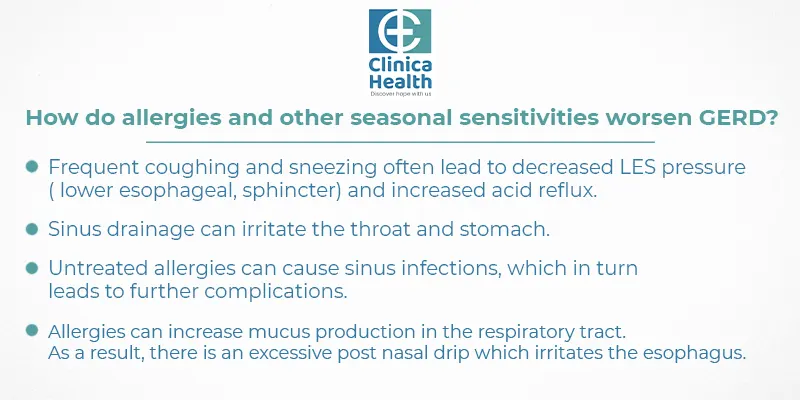-
 Call Now:
8010 552 552
7595 838 844
Call Now:
8010 552 552
7595 838 844
-
 Email Me:
clinicahealthkolkata@gmail.com
Email Me:
clinicahealthkolkata@gmail.com
As spring emerges with its vibrant bloom and pleasant weather, it also brings along a lot of potential seasonal allergies and also triggers the risk of GERD. Allergies and GERD are connected and oftentimes if the allergic reaction becomes more active, it can even make symptoms of GERD worse. Hence, understanding and managing seasonal sensitivities is essential to promote better digestive health.
In this blog, we will discuss the impact of seasonal allergies on GERD and how GERD surgery can minimize the risk of complications.
Gastro-esophageal reflux disease(GERD) is one of the most common gastrointestinal conditions and its prevalence is increasing in every age group. It is mainly caused by acid reflux in the stomach,thereby leading to adverse health conditions. Its symptoms mainly include heartburn and chest pain. In some patients, the symptoms also include nausea, bloating, and burping.
An allergic reaction is defined as a condition where a person’s immune system reacts abnormally to a foreign substance(allergen). To remove the allergen from the body, the immune cells produce antibodies, causing the release of histamine which leads to symptoms like sneezing, watery eyes, abdominal pain, and even nausea.

There are several ways by which allergies and seasonal insensitivities worsen the symptoms of GERD. Let’s know some of them.
If you are suffering from any extreme GERD complications, it is always advisable to consult a GI surgeon who might suggest GERD surgery to relieve you of the symptoms.
Treatment of GERD usually depends on the severity of your condition. However, according to the opinions of doctors, one of the most effective treatments for this condition is surgery which is known as Nissen fundoplication. The procedure involves tightening of the muscles at the bottom of the esophagus to provide permanent relief from acid reflux. In most cases, patients reported decreased acid reflux after the surgery.
Besides GERD surgery, your doctor might also suggest the following:
In most cases, patients delay in seeking treatment for GERD leading to serious conditions in the future. Please don’t do so. Always listen to your body and make informed decisions. Your doctor will diagnose your condition and suggest effective treatment that will suit you the best.